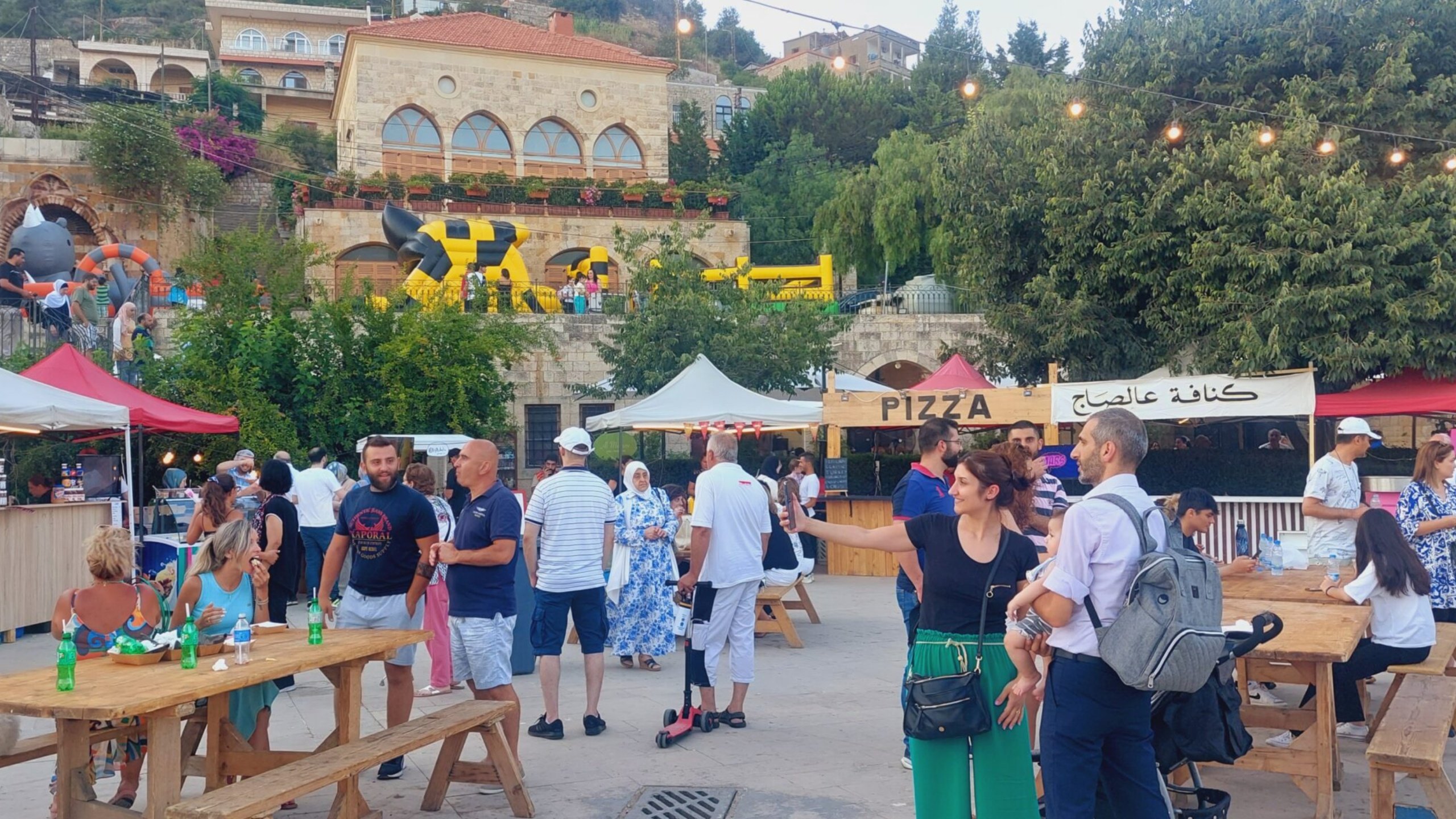WTF
The News Stories that Sparked the Most Outrage in 2013
In another end-of-year review, we go over the news stories that sparked the most outrage in Lebanon in 2013. Unsurprisingly, most of the indignation this year originated on social media, where questionable videos and photos tend to circulate aplenty.
1. Curfews on Syrian workers and refugees
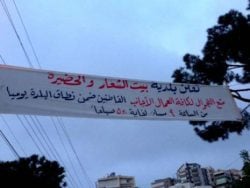
Picture shows the sign put up by Beit Al Chaar’s municipality forbidding foreign workers from circulating at night.(Photo via facebook.com)
Throughout the year, a bunch of municipalities across Lebanon announced that they would enforce new measures to control the influx of Syrian refugees, starting with early curfews. Signs soon popped up in several places, with a first sighting in Mount Lebanon in February (others were seen in Jezzine, Jounieh and Aley). The typical messages on these signs read: “The municipality announces that it is strictly forbidden for foreigners to wander the streets between 8:30 p.m. and 5:30 a.m.” They’ve been strongly denounced on social media, with many calling them racist, xenophobic, and unnecessary, and another example of the discrimination Syrians face in the country. Al Jazeera reported on the issue in June.
2. Gay nightclub patrons undergo humiliating interrogations
LBC’s video report shows pictures of transvestites who were forced to take their clothes off during the investigation.
In April, the mayor of Dekwaneh ordered a gay-friendly nightclub called Ghost to be shut down on charges of “promoting prostitution, drugs and homosexuality.” Several club-goers were arrested and forced to undress in the municipal headquarters, where they were photographed naked. The video of the mayor explaining why he decided to close the nightclub quickly went viral, with his rhetoric deemed homophobic and the arrests deemed humiliating and degrading.
3. Syrian Man Publicly Beaten and Humiliated in Tripoli

(Photo via facebook.com)
Also in April, a Syrian national by the name of Yasser Mustapha Bazzazi was assaulted in Tripoli after he was accused of being a pro-Assad shabbih. Bazzazi was dragged through the streets by a hoard of angry Lebanese men with a rope tied around his neck, only one day after a citywide rally urging civil peace. The incident was caught on camera and the video made the rounds on social media.
4. Man Loses Manhood After Marrying a Woman from a Different Sect
Ahmad spoke to Al-Jadeed from his hospital bed, identifying his assailants as his bride’s father and brother.
In July, An-Nahar newspaper reported that a man from Akkar had been beaten and castrated after he married a woman from a different sect. Details later emerged that 39-year-old Rabih Ahmad (a Sunni) had eloped with 20-year-old Roudaina Melaab (a Druze) against the wishes of the bride’s family. In an act of sectarian vendetta, the disapproving in-laws lured Ahmad to their hometown of Bayssour under false pretenses, and beat him up, pulling out several teeth and severing his penis. The story attracted international attention and was picked up by news outlets like AFP. Reactions posted on social media were mostly of shock and outrage, with many lamenting yet another act of sectarian violence.
5. The Death of Roula Yaacoub

A photo found on Roula Yaccoub’s Facebook page shows her surrounded by her surviving five children.(Photo via Facebook)
In July, 31-year-old Roula Yaacoub was found beaten and unconscious at her home following a domestic dispute with her husband, Karam Bazi. She later died from her wounds. The incident was widely discussed and denounced, and it briefly reopened the debate on domestic violence against women in Lebanon. Many were quick to criticize the fact that her husband was never charged with her death (and basically got away with impunity), and that he retained custody of the couple’s five children.
6. Man films his wife’s suicide
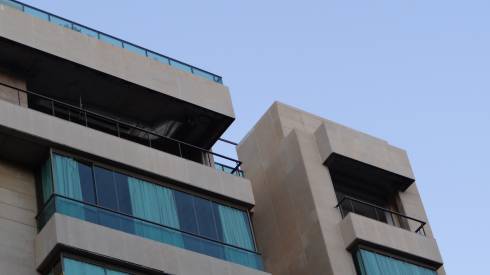
The balcony from which Amina Ismail jumped. The picture was taken by blogger Luna Safwan, who also posted the video on YouTube.
A disturbing video showing a man filming his wife jumping to her death from an eighth-floor balcony went viral in July. The footage shows a woman, later identified as Amina Ismail, sitting on a ledge of the balcony of her home in Ramlet al-Baida as her husband, Ahmad, begs her not to jump. The video circulated widely on social media, with many wondering what could have possibly motivated Ahmad to film the incident, and why it had been posted on YouTube. A source close to the couple said Ahmad wanted to avoid being implicated in his wife’s suicide; she was reportedly suffering from deep psychological problems. Some of the outrage online was also directed at the media for reporting on the story and showing the video, deemed insensitive.
7. Former MP destroys part of the Cedar Forest for his son’s wedding
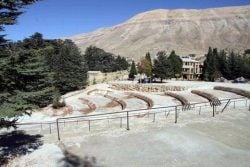
The concrete runway was constructed for the wedding of former MP Gebran Tawk’s son near the ancient cedar forests. (Photo via The Daily Star)
A story emerged in August that former MP Gebran Tawk had started bulldozing an area next to Bcharre’s ancient Cedar Forest to build a concrete amphitheater for his son’s wedding, scheduled later that month. The announcement prompted a crowd of people on social media to (virtually) scream “shame on him” in unison, most of them lamenting the lack of respect for the “sacred” site (incidentally listed on UNESCO’s World Heritage List). Activists were dead set on putting a stop to construction, calling it an “environmental catastrophe,” but it went on as planned. Security forces tried to demolish the amphitheater in October on orders from the Environment and Interior Ministries, but were stopped by supporters of Tawk. The former MP appealed for peace the following day and announced that it would indeed be removed, in accordance with the ministries’ decision.
8. Alleged Hezbollah execution in Syria
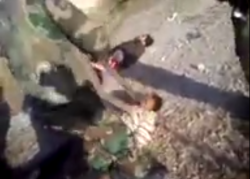
(A screenshot from the video posted on YouTube.)
An online video allegedly showing Hezbollah fighters executing wounded Syrian rebels emerged in October, sparking outrage for its incredibly gruesome content. The clip shows armed men in fatigues, at least one wearing the yellow armband sported by the Lebanese Shiite movement, dragging several men out of a van and shooting them dead. The images were described as “gory,” “shocking,” “savage,” and particularly “damning” for Hezbollah after they declined to comment. Some people also expressed fear that it would further stoke sectarian tensions in Lebanon, if confirmed.
9. The Microwaved Cat
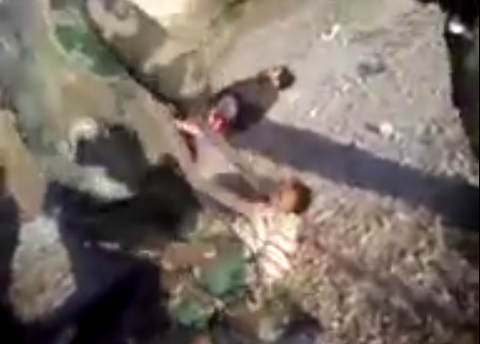
(Photo via Facebook).
In November, a short clip posted on Facebook showed a young man, later identified as Hassan Hammoud, shoving his cat inside a microwave and turning it on. The cat, named Bousbous, survived the incident but the video soon spread on the web, sparking angry comments (some commenters calling it “sickening”) and receiving extensive media coverage by international outlets like Al-Jazeera and Reddit. Many also took the opportunity to call for legislation that would criminalize animal cruelty, as there are currently no laws to protect animals in Lebanon. Hammoud later issued an apology and handed the cat over to the NGO “Animals Lebanon.” Last we heard from Bousbous, he was up for adoption and attracting a lot of attention from people offering to give him a new home.
10. Al-Jadeed Crew Detained Over Scuffle with Customs Agents
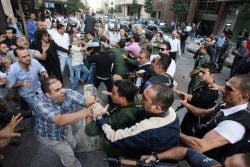
(Photo via the Daily Star)
Also in November, Al-Jadeed aired video footage showing several security officers from the Directorate of Customs in downtown Beirut beating up four of their reporters. The station said the journalists had been assaulted after one of them staked out the security agency’s headquarters and used a megaphone to demand an interview with its acting director, Shafiq Merhi, over his alleged role in corruption at Beirut’s international airport. The four men were detained and brought in for interrogation following the brawl, prompting mass protests and widespread calls for their support and release.
11. Typo in the New 50,000 LL Note

(Photo via Twitter)
Outrage might be an overstatement in this case, but many Lebanese were befuddled when a special issue 50,000 LL bank note, marking the 70th anniversary of the country’s independence, was unveiled in November sporting a pretty glaring typo. True to the country’s “hi, kifak, ça va” legacy, the French-language note spells “indépendence” as it is written in English, rather than the French “indépendance.” This was seen by many as a testament to Lebanon’s identity crisis and struggle with multilingualism, and the grammatical confusion that comes with it. Despite the spelling mistake, the notes still went into circulation, forever cementing the nation’s collective embarrassment.
1. Curfews on Syrian workers and refugees

Picture shows the sign put up by Beit Al Chaar’s municipality forbidding foreign workers from circulating at night.(Photo via facebook.com)
Throughout the year, a bunch of municipalities across Lebanon announced that they would enforce new measures to control the influx of Syrian refugees, starting with early curfews. Signs soon popped up in several places, with a first sighting in Mount Lebanon in February (others were seen in Jezzine, Jounieh and Aley). The typical messages on these signs read: “The municipality announces that it is strictly forbidden for foreigners to wander the streets between 8:30 p.m. and 5:30 a.m.” They’ve been strongly denounced on social media, with many calling them racist, xenophobic, and unnecessary, and another example of the discrimination Syrians face in the country. Al Jazeera reported on the issue in June.
2. Gay nightclub patrons undergo humiliating interrogations
LBC’s video report shows pictures of transvestites who were forced to take their clothes off during the investigation.
In April, the mayor of Dekwaneh ordered a gay-friendly nightclub called Ghost to be shut down on charges of “promoting prostitution, drugs and homosexuality.” Several club-goers were arrested and forced to undress in the municipal headquarters, where they were photographed naked. The video of the mayor explaining why he decided to close the nightclub quickly went viral, with his rhetoric deemed homophobic and the arrests deemed humiliating and degrading.
3. Syrian Man Publicly Beaten and Humiliated in Tripoli

(Photo via facebook.com)
Also in April, a Syrian national by the name of Yasser Mustapha Bazzazi was assaulted in Tripoli after he was accused of being a pro-Assad shabbih. Bazzazi was dragged through the streets by a hoard of angry Lebanese men with a rope tied around his neck, only one day after a citywide rally urging civil peace. The incident was caught on camera and the video made the rounds on social media.
4. Man Loses Manhood After Marrying a Woman from a Different Sect
Ahmad spoke to Al-Jadeed from his hospital bed, identifying his assailants as his bride’s father and brother.
In July, An-Nahar newspaper reported that a man from Akkar had been beaten and castrated after he married a woman from a different sect. Details later emerged that 39-year-old Rabih Ahmad (a Sunni) had eloped with 20-year-old Roudaina Melaab (a Druze) against the wishes of the bride’s family. In an act of sectarian vendetta, the disapproving in-laws lured Ahmad to their hometown of Bayssour under false pretenses, and beat him up, pulling out several teeth and severing his penis. The story attracted international attention and was picked up by news outlets like AFP. Reactions posted on social media were mostly of shock and outrage, with many lamenting yet another act of sectarian violence.
5. The Death of Roula Yaacoub

A photo found on Roula Yaccoub’s Facebook page shows her surrounded by her surviving five children.(Photo via Facebook)
In July, 31-year-old Roula Yaacoub was found beaten and unconscious at her home following a domestic dispute with her husband, Karam Bazi. She later died from her wounds. The incident was widely discussed and denounced, and it briefly reopened the debate on domestic violence against women in Lebanon. Many were quick to criticize the fact that her husband was never charged with her death (and basically got away with impunity), and that he retained custody of the couple’s five children.
6. Man films his wife’s suicide

The balcony from which Amina Ismail jumped. The picture was taken by blogger Luna Safwan, who also posted the video on YouTube.
A disturbing video showing a man filming his wife jumping to her death from an eighth-floor balcony went viral in July. The footage shows a woman, later identified as Amina Ismail, sitting on a ledge of the balcony of her home in Ramlet al-Baida as her husband, Ahmad, begs her not to jump. The video circulated widely on social media, with many wondering what could have possibly motivated Ahmad to film the incident, and why it had been posted on YouTube. A source close to the couple said Ahmad wanted to avoid being implicated in his wife’s suicide; she was reportedly suffering from deep psychological problems. Some of the outrage online was also directed at the media for reporting on the story and showing the video, deemed insensitive.
7. Former MP destroys part of the Cedar Forest for his son’s wedding

The concrete runway was constructed for the wedding of former MP Gebran Tawk’s son near the ancient cedar forests. (Photo via The Daily Star)
A story emerged in August that former MP Gebran Tawk had started bulldozing an area next to Bcharre’s ancient Cedar Forest to build a concrete amphitheater for his son’s wedding, scheduled later that month. The announcement prompted a crowd of people on social media to (virtually) scream “shame on him” in unison, most of them lamenting the lack of respect for the “sacred” site (incidentally listed on UNESCO’s World Heritage List). Activists were dead set on putting a stop to construction, calling it an “environmental catastrophe,” but it went on as planned. Security forces tried to demolish the amphitheater in October on orders from the Environment and Interior Ministries, but were stopped by supporters of Tawk. The former MP appealed for peace the following day and announced that it would indeed be removed, in accordance with the ministries’ decision.
8. Alleged Hezbollah execution in Syria

(A screenshot from the video posted on YouTube.)
An online video allegedly showing Hezbollah fighters executing wounded Syrian rebels emerged in October, sparking outrage for its incredibly gruesome content. The clip shows armed men in fatigues, at least one wearing the yellow armband sported by the Lebanese Shiite movement, dragging several men out of a van and shooting them dead. The images were described as “gory,” “shocking,” “savage,” and particularly “damning” for Hezbollah after they declined to comment. Some people also expressed fear that it would further stoke sectarian tensions in Lebanon, if confirmed.
9. The Microwaved Cat

(Photo via Facebook).
In November, a short clip posted on Facebook showed a young man, later identified as Hassan Hammoud, shoving his cat inside a microwave and turning it on. The cat, named Bousbous, survived the incident but the video soon spread on the web, sparking angry comments (some commenters calling it “sickening”) and receiving extensive media coverage by international outlets like Al-Jazeera and Reddit. Many also took the opportunity to call for legislation that would criminalize animal cruelty, as there are currently no laws to protect animals in Lebanon. Hammoud later issued an apology and handed the cat over to the NGO “Animals Lebanon.” Last we heard from Bousbous, he was up for adoption and attracting a lot of attention from people offering to give him a new home.
10. Al-Jadeed Crew Detained Over Scuffle with Customs Agents

(Photo via the Daily Star)
Also in November, Al-Jadeed aired video footage showing several security officers from the Directorate of Customs in downtown Beirut beating up four of their reporters. The station said the journalists had been assaulted after one of them staked out the security agency’s headquarters and used a megaphone to demand an interview with its acting director, Shafiq Merhi, over his alleged role in corruption at Beirut’s international airport. The four men were detained and brought in for interrogation following the brawl, prompting mass protests and widespread calls for their support and release.
11. Typo in the New 50,000 LL Note

(Photo via Twitter)
Outrage might be an overstatement in this case, but many Lebanese were befuddled when a special issue 50,000 LL bank note, marking the 70th anniversary of the country’s independence, was unveiled in November sporting a pretty glaring typo. True to the country’s “hi, kifak, ça va” legacy, the French-language note spells “indépendence” as it is written in English, rather than the French “indépendance.” This was seen by many as a testament to Lebanon’s identity crisis and struggle with multilingualism, and the grammatical confusion that comes with it. Despite the spelling mistake, the notes still went into circulation, forever cementing the nation’s collective embarrassment.



